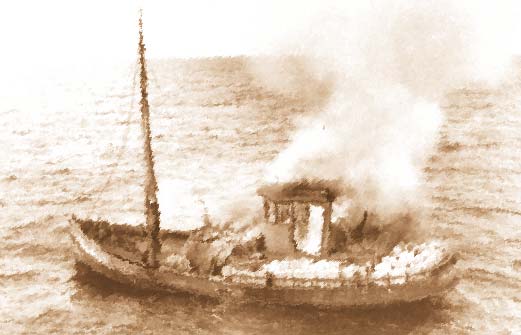Alcohol Prohibition History
Alcohol Prohibition as a U. S. policy started
in 1920 in order to try and deal with alcohol-related social issues
on a national scale. In fact, alcohol prohibition in the United
States started much earlier. In 1629, the Virginia Colonial Assembly
put forth some rules on excessive drinking, "Ministers shall
not give themselves to excess in drinkinge, or riott, or spending
their tyme idellye day or night." In 1633, the Plymouth Colony
ruled that the sale of spirits "more than 2 pence worth to
anyone but strangers just arrived" would be prohibited.

Rum Runners
in the Roaring '20's have their boat destroyed by the U. S. Coast
Guard
In 1785, Dr. Benjamin Rush published his "Inquiry into the
Effects of Ardent Spirits Upon the Human Body and Mind" which
outlined the diseases of the body and mind associated with drinking
distilled spirits. Rush said the symptoms of excessive drink included,
"unusual garrulity, unusual silence, captiousness ... an
insipid simpering ... profane swearing ... certain immodest actions
and certain extravagant acts which indicate a temporary fit of
madness."
From 1849 to 1851, Father Theobald Matthew of Ireland toured
the United States preaching of temperance and total abstinence
to approximately 600,000 persons in 25 states. His calls to action
had the blessing of the White House and the Senate.
In the 1840's and 1850's a number of states passed prohibition
laws including Oregon, Delaware, Maine, Ohio, Illinois, Rhode
Island, Minnesota, Massachusetts, Connecticut, Pennsylvania and
New York. These laws were all shot down by the veto from the governors,
repeal by the legislatures and invalidation by the state supreme
courts.

In the 1900's Prohibition was fueled
by anti-German sentiment from World War I and moving into the
WWII as well. The Temperance Movement started associating German
beer with a conflict in patriotism. The Wartime Prohibition Act
was passed in 1918. Also, in 1918, the 18th Amendment to the Constitution
was ratified prohibiting the manufacture, sale, transportation
or importation of alcoholic beverages in the United States.
In the 1920's when Prohibition was in full force the institution
of the speakeasy replaced the institution of the saloon. Bootleggers
proliferated, illicit distilleries bloomed, foreign rum-runner
appeared, government warehouses were raided, federal agents
were killed and the courts were overwhelmed with liquor violation
cases. The U. S. government had not anticipated such a huge
backlash to the prohibition laws. The experiment of an alcohol-free
culture evaporated 13-years later.
Congress officially adopted the 21st Amendment to the Constitution
repealing Prohibition on December 5, 1933.
|


